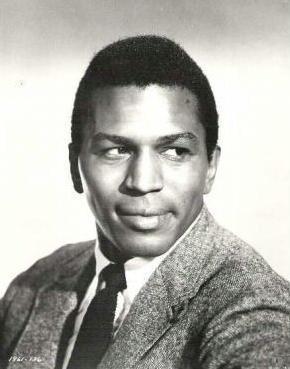Hari Rhodes (Hari Rhodes)

In 1960, Hari Rhodes appeared in five television series: General Electric Theater, hosted by Ronald W. Reagan; The Detectives Starring Robert Taylor, Have Gun, Will Travel, starring Richard Boone, The Westerner, starring Brian Keith, and in two episodes of Adventures in Paradise, starring Gardner McKay. In 1961, he was cast in an episode of ABC’s Hawaii-based drama, Follow the Sun. In 1963, he played a patrolman in “Death of a Cop” on CBS’s The Alfred Hitchcock Hour. From 1966-69, Hari Rhodes was a regular on Daktari as Mike Makula. In 1969 Rhodes starred in the short-lived series The Bold Ones: The Protectors. His most notable television role came in 1977 in the ABC miniseries, Roots, in which he was cast as a leader of Kunta Kinte’s village. He had a pioneering role as an African-American in science fiction television. His portrayal of a Lt. Travers, member of a lunar exploration team in the “Moonstone” episode of The Outer Limits (1964), pre-dated Nichelle Nichols’ portrayal of a black member (Lt. Uhura) of a space exploration crew on Star Trek. His early film roles included appearances in The Nun and the Sergeant (1962), Drums of Africa (1963), Shock Corridor (1963), The Satan Bug (1965), and Mirage (1965). In 1966, he played a supporting role as Captain Davis in the successful suspense-comedy motion picture Blindfold, starring Rock Hudson and Claudia Cardinale. He also played Mr. MacDonald, who aids Caesar in Conquest of the Planet of the Apes (1972), and was the star of the blaxploitation film Detroit 9000 (1973). His later film credits included Mayday at 40,000 Feet! (1976), The Hostage Heart (1977), Coma (1978), and the Burt Reynolds cop thriller Sharky’s Machine (1981).
Hari Rhodes first television role was in a 1957 episode of Dick Powell’s Zane Grey Theater that starred Sammy Davis Jr. The role came just one year after Rhodes had received a rude lesson in racial prejudice. “I read about a training program a major studio had for grooming people for ‘stardom.’ Being naive about the system, I got on the phone and called the man in charge and asked if he would interview me, and he told me to come around to the studio,” Rhodes told TV Guide in 1968. “I said, ‘By the way, I think I should tell you that I am a Negro.’ He said, ‘Don’t waste your time – we don’t take Negroes in this program.’ I hung up the phone. Almost tore the cradle off the thing.” Hari Rhodes channeled his anger into a novel, A Chosen Few, which was published in a paperback edition. A Chosen Few was described as “an explosive personal portrait of what (Rhodes) saw and lived through in the heart of the American South in the last all-Negro Marine boot camp.” The novel’s uneducated hero remarks, “Bitterness … is a consuming, cancerous quality out of which comes nothing but self-destruction, while out of an anger can come many constructive things, if nothing more than the drive to get something done.” Hari Rhodes later penned two unpublished novels: Harambee, about a man with a plan to liquidate the world’s entire Caucasian population, and Land of Odds, about Hollywood. Rhodes told TV Guide that writing served as his safety valve. “I’d rather be writing my own than reading somebody else’s. I have no need for it.” Rhodes said. Hari Rhodes died of a heart attack in January 1992, a few months before the premiere of his final project, the made-for-TV feature Murder Without Motive: The Edmund Perry Story.
Born
- April, 10, 1932
- USA
- Cincinnati, Ohio
Died
- January, 15, 1992
- USA
- Canoga Park, Los Angeles, California
Cause of Death
- heart attack
Other
- Cremated



